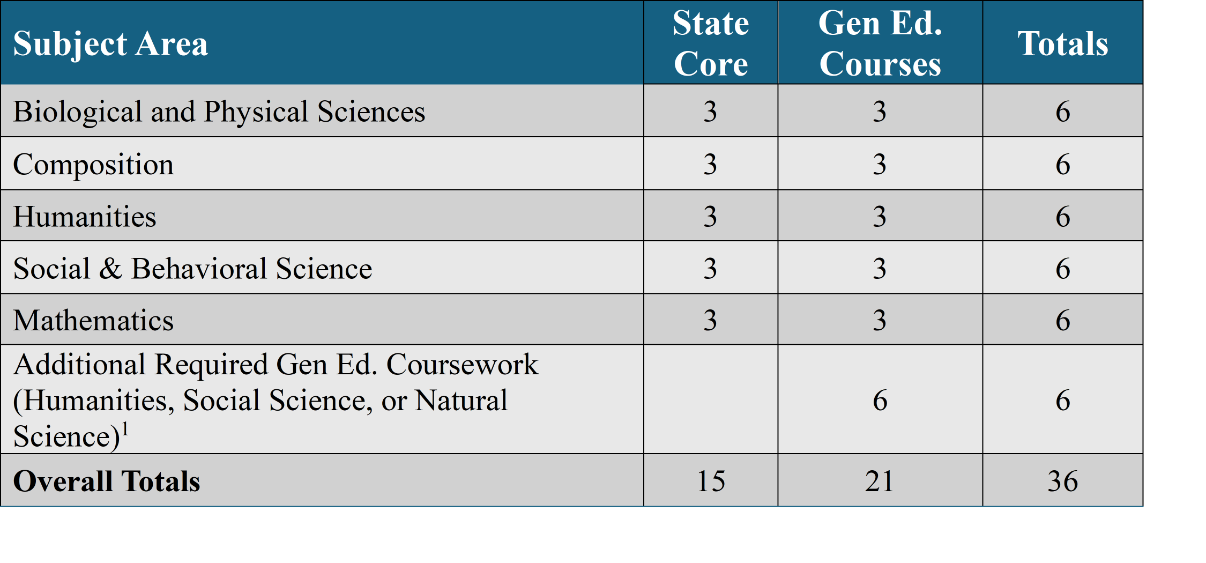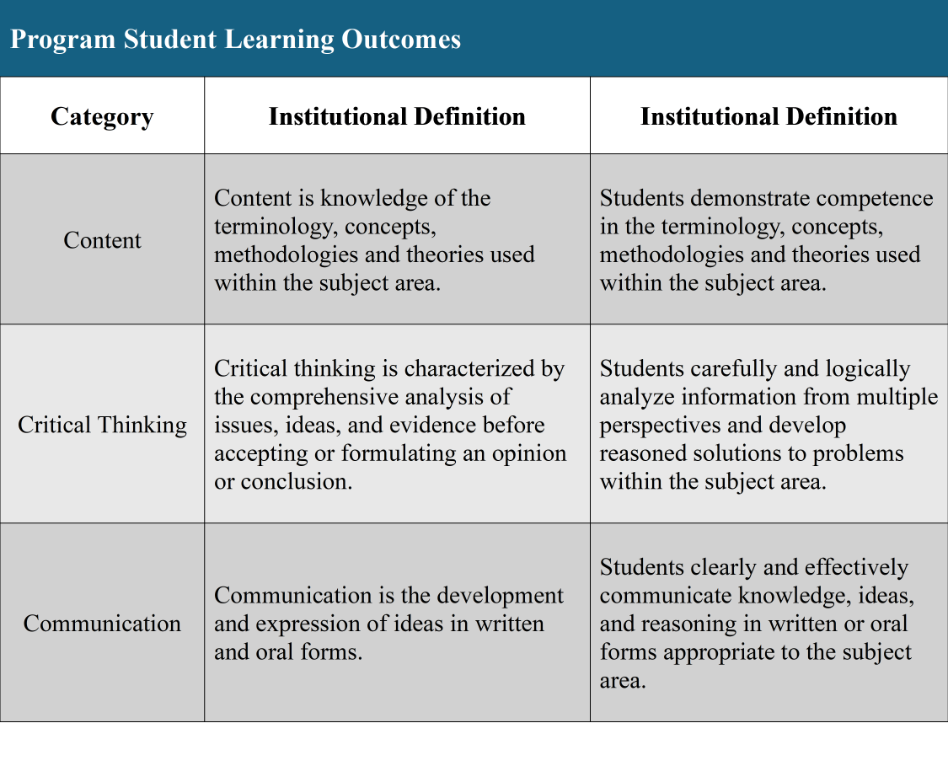General Education
The University of Florida General Education Program includes approximately 300 undergraduate courses in the program areas of composition, humanities, mathematics, biological science, physical science, and social and behavioral science, with many of these courses also having an international focus.
General Education courses must be general in nature and not focus narrowly on skills, techniques, or procedures specific to a particular occupation or profession. Any prerequisite for a General Education course must themselves be courses in the General Education program. The content of these courses must address the appropriate general education subject area objective, which describes the contest within which the student learning outcomes (SLOs) are achieved, and the course should be designed to permit assessment of the SLOs. The course syllabus must meet the Gen Ed. Syllabus Policy requirements (in addition to the UF Syllabus Policy), and the assignments and assessments should conform to the General Education Policy on Academic Standards of Excellence and the Grade Integrity Policy.
The General Education Committee (GEC) is responsible for reviewing, in accordance with established criteria, all course proposals seeking General Education designations or fulfillment of University Writing requirements. To submit an item to the GEC for review, please fill out the corresponding request here.
Existing Gen Ed. courses are reviewed annually, and new courses undergo rigorous review to ensure adherence to policies established by State Statutes 1007.25 and 1007.55, as well as by the University of Florida.
Apply Incoming Credits to General Education
AP, IB, AICE, and CLEP credit count towards completion of the general education program requirements. In general, course equivalencies are derived from the course equivalency charts from the student's year of matriculation at UF.
Acceptable dual enrollment and other transfer credit will fulfill the general education requirements that the same UF course fulfills if the course is equivalent. Courses from Florida public colleges and State University System schools generally adhere to the Statewide Course Numbering System. If the prefix (first three letters) and the last three digits of the course number are the same, then the course is considered equivalent.
If the course does not have a common-numbered equivalent at UF (either because UF does not offer the course or because the transferred course was not taken in the state system), then the student's college needs to evaluate the course to determine whether it fulfills a general education requirement.
General Education Program Requirements
All undergraduate students (except those transferring to UF with an A.A. degree from a Florida public college or an A.A. certificate from a Florida public state university ) are required to complete UF's general education requirement to graduate.

1Majors that feature extensive use of these subject areas may require a student to complete all 6 "Additional Required Gen Ed. Coursework" credits in a particular subject area. See the major's Model Semester Plan for details.
*For additional information regarding the General Education Subject Area Objectives, please see the General Education Subject Area Objectives page.
Important Considerations
- A minimum grade of C is required for general education credit. Courses intended to satisfy the general education requirement cannot be taken S-U.
- Three credits must be from a general education mathematics course with a prefix of MAC, MAP, MAS, MGF or MHF (a.k.a., 'pure math').
- The general education program also requires the completion of a 3-credit course with the International (N) designation). Some majors require or recommend specific general education courses.
- Study abroad courses can fulfill international credit, in addition to fulfilling credit in other subject areas. Study abroad must be approved in advance by an academic advisor and the UF International Center.
General Education Student Learning Outcomes
The General Education Student Learning Outcomes (SLOs) describe the knowledge, skills and attitudes that students are expected to acquire while completing a General Education course at the University of Florida. The SLOs fall into three categories: content, communication and critical thinking. Every general education course must address all three SLOs.

Explore below how these student learning outcomes are applied across general education subject areas.
Subject Area Student Learning Outcomes
The General Education subject area objectives describe the contest within which the student learning outcomes are achieved.
Composition
- Content: Select and apply writing process strategies, including how to discover a topic, how to develop and organize a text, and how to adapt writing style and format to different audiences, purposes, and context.
- Critical Thinking: Compare various genres of writing. Critique complex texts in writing using valid claims and persuasive evidence. Analyze texts for rhetorical competency.
- Communication: Compose written texts for scholarly or professional purposes. Communicate using accepted conventions of standard written English and apply the techniques that produce effective texts.
Humanities
- Content: Identify, describe, and explain the history, underlying theory and methodologies used.
- Critical Thinking: Identify and analyze the relevant factors that shape thought within the subject area. Approach issues and problems within the discipline from multiple perspectives.
- Communication: Communicate knowledge, thoughts and reasoning clearly and effectively.
International
- Content: Identify, describe, and explain the historical, cultural, economic, political, and/or social experiences and processes that characterize the contemporary world.
- Critical Thinking: Analyze and reflect on the ways in which cultural, economic, political, and/or social systems and beliefs mediate understandings of an increasingly connected contemporary world.
- Communication: The international designation is always in conjunction with another category. Communication outcomes are listed in those subject areas.
Mathematics
- Content: Employ strategies in fundamental mathematics, including at least one of the following: solving equations and inequalities, logic, statistics, algebra, or trigonometry.
- Critical Thinking: Reason in abstract mathematical systems and use mathematical models to solve problems. Apply mathematical concepts effectively to real-world situations.
- Communication: Formulate mathematical models and arguments. Communicate mathematical solutions clearly and effectively.
Physical & Biological Sciences
- Content: Identify, describe, and explain the basic concepts, theories and terminology of natural science and the scientific method; the major scientific discoveries and the impacts on society and the environment; and the relevant processes that govern biological and physical systems.
- Critical Thinking: Formulate empirically-testable hypotheses derived from the study of physical processes or living things; apply logical reasoning skills effectively through scientific criticism and argument; and apply techniques of discovery and critical thinking effectively to solve scientific problems and to evaluate outcomes
- Communication: Communicate scientific knowledge, thoughts, and reasoning clearly and effectively.
Social & Behavioral Sciences
- Content: Identify, describe, and explain key themes, principles, and terminology; the history, theory and/or methodologies used; and social institutions, structures and processes.
- Critical Thinking: Apply formal and informal qualitative or quantitative analysis effectively to examine the processes and means by which individuals make personal and group decisions. Assess and analyze ethical perspectives in individual and societal decisions.
- Communication: Communicate knowledge, thoughts and reasoning clearly and effectively.